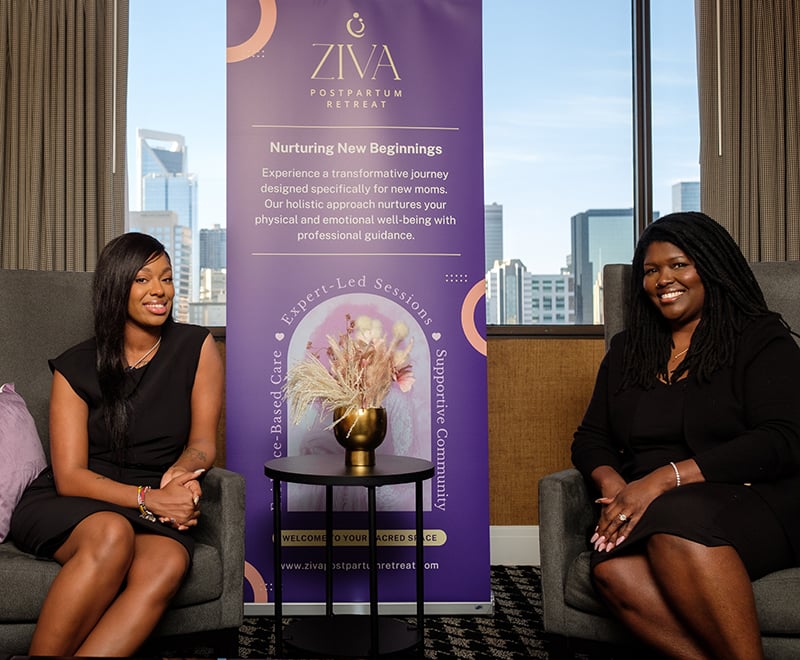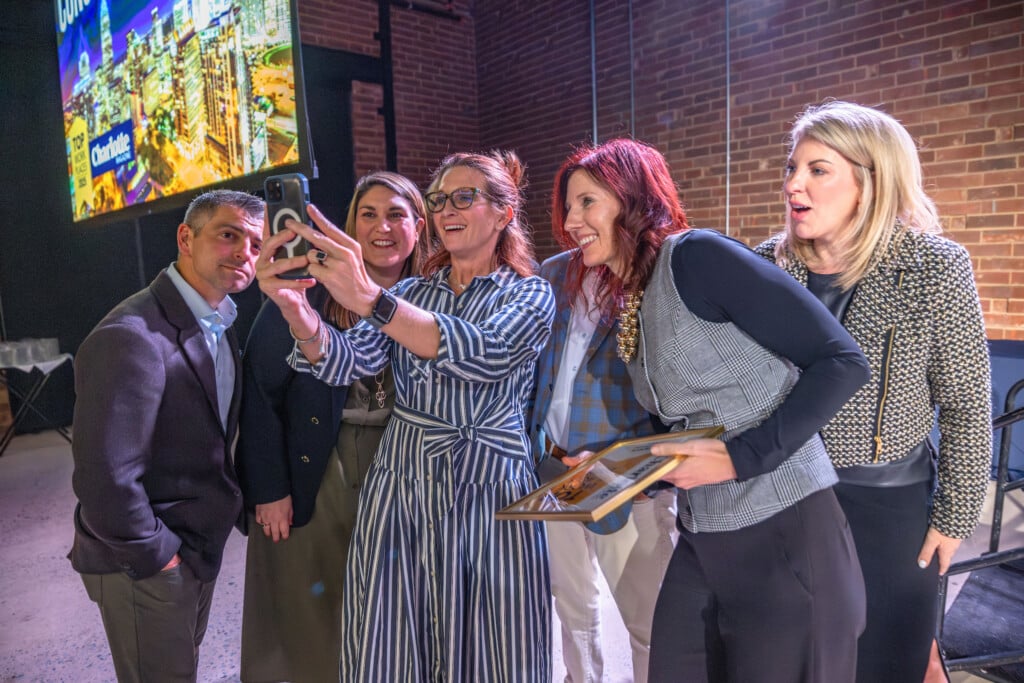Ziva Postpartum Retreat Fills A Gap For New Moms in Charlotte
A team of moms bring the first full-service, overnight postpartum support center to North Carolina

Selena Williams had lived and worked in New York for 23 years before she became a single mother by choice. Her support system of family and friends were back in North Carolina, so she planned to check into a postpartum retreat after she delivered her baby. But her plans changed when her mother got sick, and the former litigation e-discovery professional moved back to Charlotte to care for her as she adjusted to life with her newborn.
When her son was a few months old, Williams attended a Romp n’ Roll class, where she met Lauren Hall, a mother of two who owned a personal assistant business. They started talking about their postpartum struggles and the lack of support they’d had.
“I had a really bad postpartum experience with my second son,” Hall says. “I wasn’t familiar with what postpartum depression was or what any of that looked like. I lost a tremendous amount of weight because I wasn’t thinking of myself at all. With my first, I had a lot of support, but with my second, I felt so alone. I thought, I can’t be the only one who feels like this.”
Williams told her about the postpartum retreat in New York. “We agreed that every mom should have that,” Williams says. “Lauren was like, ‘We should open that here!’”
That was in April 2024. Ten months later, the pair opened Ziva Postpartum Retreat, the first full-service, overnight postpartum retreat in North Carolina—and the second Black-owned postpartum retreat in the U.S. Ziva, Hebrew for “radiance,” is inside the Le Meridien Hotel uptown and offers new mothers round-the-clock newborn care while they heal from childbirth. It has access to lactation consultants, postpartum therapists, meditation and yoga classes, meals and snacks, and add-ons like postnatal massages and manicures. Mothers can book stays for three, five, seven, or more nights.
Ziva recommends reservations after 25 weeks’ gestation, but mothers can book a stay up to 12 weeks postpartum. Since it opened in February, Hall says, most clients have been last-minute bookings. “We thought people would book ahead of time—we recommend that—but it’s been a lot of moms who say, ‘I didn’t know it was going to be like this.’”

At Ziva, Mothers get a king suite with a bassinet and 24/7 access to a nursery staffed with postpartum doulas. Courtesy, Alvin C. Jacobs Jr.
It’s a common—and sometimes difficult—realization for a first-time mom. She can read the parenting books, take infant CPR classes, and have all the nursery essentials. But it’s impossible to anticipate how she’ll feel once she’s discharged from the hospital, aching and desperate for sleep, with a tiny human to care for. If the birth left her anxious or traumatized, she’s told, “All that matters is a healthy baby.” The message is clear: Her role is to endure and adapt.
“A lot of moms have gone home, tried to do it themselves, then they call us,” Williams says. “They come to us in crisis, so it’s a fire drill all the time. We had a woman eight weeks postpartum who was losing it. You can come here to collect yourself mentally and physically, and you’ll have all the support you need.”
Postpartum retreats have grown in popularity in Europe and Asia since the 1990s. In South Korea, eight in 10 new mothers check into one. While they’re starting to gain traction in the U.S., they’re still considered a luxury that’s not covered by insurance or subsidized by the government.
Postpartum care in the U.S. is usually limited to a single checkup six weeks after delivery, and one in four American women return to work within two weeks of giving birth. The U.S. is the only developed nation without a federal paid family-leave policy and ranks first in maternal and infant mortality among developed countries.
Giving birth is arguably the most painful, body-altering thing a human can experience, even after an uncomplicated delivery. A cesarean, which accounts for about one in three live births in the U.S., is the only surgery in which seven layers of tissue are opened—and the mother is expected to stand up six hours later while she endures intense cramps as her uterus returns to its normal size. At the same time, she’s learning how to breastfeed, another physically demanding process that often comes with sore, cracked nipples and blocked milk ducts.
Then there’s the mental component. The sharp drop in estrogen and progesterone levels in the days and weeks after giving birth—compounded with sleep deprivation—can cause intense mood swings, anxiety, and depression. The American Journal of Managed Care reports that 20% of American mothers experience postpartum depression. At six weeks postpartum, most women get the “all clear,” but the return to pre-pregnancy hormone levels can take up to six months.
It’s not motherhood that breaks women; it’s the systemic gap in care. That’s what Lin Hu aims to fix.
Hu is a licensed clinical mental health counselor and one of three postpartum therapists who works with new mothers at Ziva. While this service is an add-on, the vast majority of mothers request it. “I meet with them privately in their room, where they feel comfortable,” Hu says. “I gather information about their background and history and look for signs and symptoms we need to pay more attention to.”
Some might have intrusive thoughts connected to anxiety about the safety of their babies. Others might fear changes in their relationships or how the added responsibility of motherhood might affect their career potential. Hu teaches them coping skills and, depending on the severity of their symptoms, she might continue with outpatient therapy. In extreme cases of postpartum depression or psychosis, she refers them to a psychiatrist to get assessed for medication.
For Hu, a native of China, this work was intuitive. “In Chinese culture, there’s a deep understanding of how much support a woman needs after giving birth,” she says. “We call it ‘sitting the month,’ where a new mother stays at home for about a month after giving birth to focus on rest and recovery. In contrast, in our modern society, there’s that expectation that women should bounce back and get it together … but it’s not a brief recovery period. It’s a total transformation. It takes a lot of time and support to navigate that.”
A stay at Ziva can range from $1,230 to $1,350 per night and includes 24/7 access to a nursery, lactation consultant, and postpartum doula care. “The cost is very specific to the person and what they want,” Williams says. “Some might not need overnight care and might not want a doula knocking on their door every 10 minutes. Some do want to be checked throughout the night. So the price can vary greatly.”
Each client gets a king suite with a bassinet, plus three meals a day and unlimited snacks and drinks. She can bring one support person or her other children if this isn’t her first. The retreat is available to any new mother, regardless of delivery method.
Each morning, mothers have breakfast delivered to their rooms. After that, they can take a yoga and meditation class designed for postpartum bodies. Instructors also teach breathing exercises and calming techniques that mothers can do at home.
Some mothers might book a session with a lactation consultant who can assist with latching, positioning, and pumping. Others might schedule a pedicure or postpartum massage in their rooms. “Our main focus is on mom and what mom needs mentally and physically,” Williams says. “This is what mom needs to get back some semblance of herself. Even getting a pedicure feels like, Oh, I remember who I was.”
After lunch, they might attend a baby-wearing class to learn the correct way to use carriers and slings. In the mother’s lounge, moms sit on couches and in wingback chairs, propped up by pillows as they nurse their babies and swap birth stories
Mothers can have dinner delivered to their rooms or leave their babies in the nursery and eat at the hotel restaurant with their spouses or partners. The nursery is staffed with postpartum doulas, and all bassinets come with attached monitors so parents can check in on their little ones anytime.
In the evenings, a belly-binding specialist is available to meet mothers in their rooms to wrap cloth around her abdomen and hips. The process, which dates back to 17th-century Malaysia, supports the pelvic floor and offers gentle compression that holds muscle and ligaments in place as the body heals. “This was Selena’s idea—her doula did it, and it was a big hit,” Hall says. “Basically, it helps get your organs back in place after everything shifted for nine months.”
With more companies starting to offer some coverage for in vitro fertilization (IVF), Hall is hopeful that attitudes toward postpartum retreats will shift, too. “I think we all have to band together to make it happen,” she says. “I think that’s why IVF is covered. The same thing has to happen with the retreats. But IVF is still about babies, yet again, and not about the aftercare.”
Until postpartum care gets the attention it deserves, postpartum retreats will be available to a privileged few. Still, Williams and Hall hope for a future where American mothers can access at least some of these support services. “I hope it’s normalized and not something we have to keep educating people on,” Hall says. “After you have a baby, the conversation should be, ‘I’m going to a postpartum retreat,’ not, ‘What’s that?’ This should be already known.”






